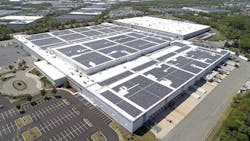Iron Mountain Adds Hourly Renewable Energy Tracking for its Data Centers
Environmental stewardship is a growing priority for customers of IT services, and Iron Mountain is taking steps to provide customers with more granular data about the carbon impact of their data center infrastructures. The company said that it will begin tracking the hourly renewable content of the energy used in several of its data centers.
Iron Mountain is teaming with RPD Energy and Direct Energy to source 100 percent renewable energy aimed at matching the hourly usage renewable energy load of electricity used in more than 60 Iron Mountain facilities in Pennsylvania and New Jersey, including its data centers in Edison, New Jersey and Boyers, Pa.
The company said that matching usage on an hourly basis will improve upon current renewable power solutions that seek to match a buyer’s load on an annual or monthly basis. Tracking hourly usage from the generator and comparing it to Iron Mountain’s hourly usage “demonstrates a future view of how firms can transition to truly carbon free energy supply,” the company said.
“Iron Mountain is seeking to move beyond the conventional approach of matching renewable power on an annual basis, to matching renewable power generation with its hourly energy use,” said stated Chris Pennington, Global Energy Manager at Iron Mountain Data Centers. “This is ultimately the path needed to decarbonize energy use. We are proud to push the marketplace and be at the forefront of embracing and adopting this unique approach and believe that RPD and Direct Energy have assembled a highly repeatable product that will become a readily available retail product.”
Energy Tracking Moves Beyond the Hyperscale Realm
The only other data center provider that has aspired to this level of energy tracking is Google, which said last year that it will match every hour of its data center operations to carbon-free energy sources. As one of the world’s largest technology companies, Google has the resources to create “carbon heat maps” of its energy and the analytics to correlate that energy to its data center operations.
With today’s announcement, Iron Mountain seeks to bring similar capabilities to its multi-tenant data centers. The initiative brings together multiple partners to manage the diverse facets of the renewable energy supply chain.
RPD Energy sources blocks of physical renewable energy directly from local wind, solar and hydro projects. It also buys the renewable energy certificates (RECs) associated with this renewable energy, and offers a green energy product with a buyer’s preferred contract volume and term. For many companies, this structure is more accessible than power purchase agreements (PPAs), which typically require a long-term contract for a large volume of power.
RPD will work with Direct Energy, which sells energy in New Jersey and Pennsylvania, to provide Iron Mountain a monthly report to document the match of average hourly generation and Iron Mountain’s actual hourly offtake from the grid. To maintain the integrity of the renewable impact of the transaction, traceability and environmental claims are ensured by renewable energy credits provided via EDP Renewables North America and sourced from the same renewable developer.
The process reflects the complexity of provisioning and tracking renewable energy at scale. But it also highlights the opportunity for companies like Iron Mountain, especially as more enterprise customers seek detailed sustainability impact reporting from service providers.
“We hope transactions like these can demonstrate that the market is capable of greater flexibility to meet increasingly aggressive demands for truly 24/7 renewable power” said Eric Alam, CEO of RPD Energy. “RPD Energy’s role was to identify the right committed generator and retail supplier to ensure that Iron Mountain could achieve a truly unique outcome. Working with Axpo U.S. to design a wholesale transaction that worked for EDP Renewables North America, and with the team at Direct to create the retail product that fit Iron Mountain’s requirements required the kind of patience, resolve, and cooperation across all parties that results in these breakthrough transactions.”






